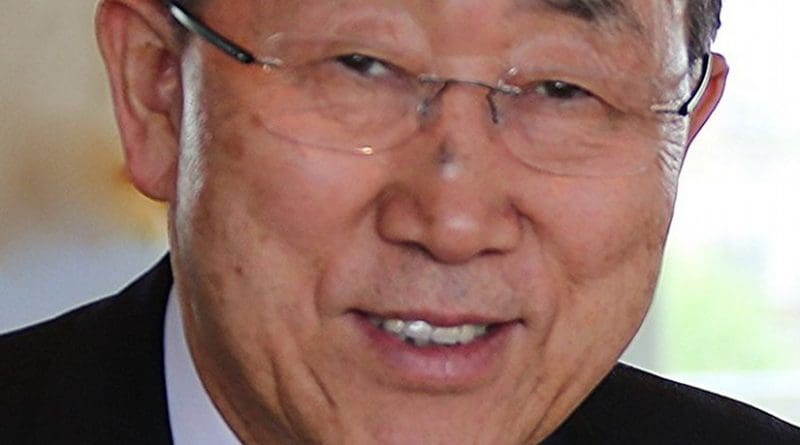UN’s Ban Says Two-State Solution In Middle East ‘Tragically More Distant’ Than Ever
By UN News
United Nations Secretary-General Ban Ki-moon warned today that a two-state solution, which envisages peaceful co-existence of Palestine and Israel, seems more distant than it has for many decades, citing the ongoing violence, Israel’s settlement activity and demolitions of Palestinian homes, and the absence of Palestinian unity.
“For over six months, Israel and the Occupied Palestinian Territory have been gripped by a surge in violence, triggered by individual terrorist attacks by Palestinians,” he told the Security Council in a regular briefing, noting that more than two dozen Israelis and two hundred Palestinians have been killed.
While welcoming the joint Palestinian-Israeli efforts that have contributed to a reduction of tensions in recent weeks, the latest killings have only deepened the legacy of divisiveness, hatred and grief, he said.
Mr. Ban urged Israeli and Palestinian leaders to elevate public discourse above mutual accusations, and to engage in a constructive dialogue that can rebuild the trust that has all but evaporated.
The diplomatic Middle East Quartet, comprising the UN, the European Union, the United States and Russia, which mediates the peace process, is moving forward on a report that will review the situation on the ground, the threats to a two-state solution, and provide recommendations on how to advance peace, he said.
“Tragically, this solution seems more distant than it has for many decades,” he said. “A 20-year-old Palestinian living under occupation has seen no political progress at all during his or her lifetime,” he noted.
Israel continues to demolish Palestinian structures in the West Bank at an alarming rate. The total number of demolitions in 2015 was exceeded in the first three months of this year. More than 700 people have been displaced.
He said he was also concerned by the continued punitive demolitions of homes belonging to families of alleged Palestinian perpetrators of attacks against Israelis. Punitive demolitions are a form of collective punishment, which is prohibited under international law.
This, together with last month’s declaration of “state land,” signal that Israel’s strategic settlement enterprise continues to expand on land intended for a future Palestinian state. “I once again reiterate that settlements are illegal under international law and undermine the two-state solution,” Mr. Ban said.
“The creation of new facts on the ground through demolitions and settlement building raises questions about whether Israel’s ultimate goal is in fact to drive Palestinians out of certain parts of the West Bank, thereby undermining any prospect of transition to a viable Palestinian state,” he said.
On the Palestinian political front, Mr. Ban expressed regret that the continued failure of intra-Palestinian discussions to achieve genuine unity on the basis of non-violence, democracy and the PLO principles, calling again on Palestinian factions to demonstrate their commitment to reconciliation, which is integral to reaching the goal of Palestinian statehood.
In Gaza, the security situation has calmed in recent weeks; however on 14 April, three rockets were fired from Gaza towards Israel. No injuries were reported, but he condemned all attacks and called on all parties to avoid further escalation that jeopardize the lives of Israeli and Palestinian civilians.
The Palestinian Government has laid out an ambitious $3.8 billion agenda for stabilizing Gaza, repairing damage from the 2014 conflict, and getting recovery underway. Economic development and rebuilding critical electricity and water infrastructure are essential. He welcomed that on 3 April, Israel expanded the Gaza fishing zone from six miles to nine nautical miles.
“The path out of the current political deadlock requires commitment, compromise, mutual respect and leadership on both sides. It also requires the acceptance – demonstrated by deeds as well as words – that the two-state solution is the only road to peace that meets the national aspirations of both peoples,” he said.
Turning to Lebanon, he said he addressed political and security issues with Lebanese leaders during his visit to Beirut on 24 and 25 March, consistent with the concerns of the Security Council.
These included: the importance of preserving Lebanon’s model of pluralism and coexistence from regional tensions; the urgency of electing a President without further delay; and the need for all parties to work with Prime Minister Tammam Salam to enable the Government to function effectively and to continue to engage in political dialogue.
They also discussed the importance of sustained international support for the Lebanese Armed Forces, and the expectation that both Lebanon and Israel work to consolidate stability along the Blue Line and advance the implementation of resolution 1701 – which imposed a ceasefire in the Israeli-Hizbollah conflict of 2006 .
At the outset, he gave a brief report on his trip to Lebanon, Iraq, Jordan and Tunisia three weeks ago, noting that the trip sought to highlight the need to increase development assistance through innovative financing mechanisms for countries like Lebanon and Jordan that are disproportionately impacted by the conflict in Syria.
He said that last Friday, he, together with the Presidents of the World Bank and the Islamic Development Bank, co-chaired a ministerial-level conference to garner the financial support for this initiative. Eight countries and the European Union generously pledged $1 billion for a concessional loan facility, $141 million in grants, and $500 million for a guarantee facility, and many other countries expressed support for this innovative initiative, he noted.

